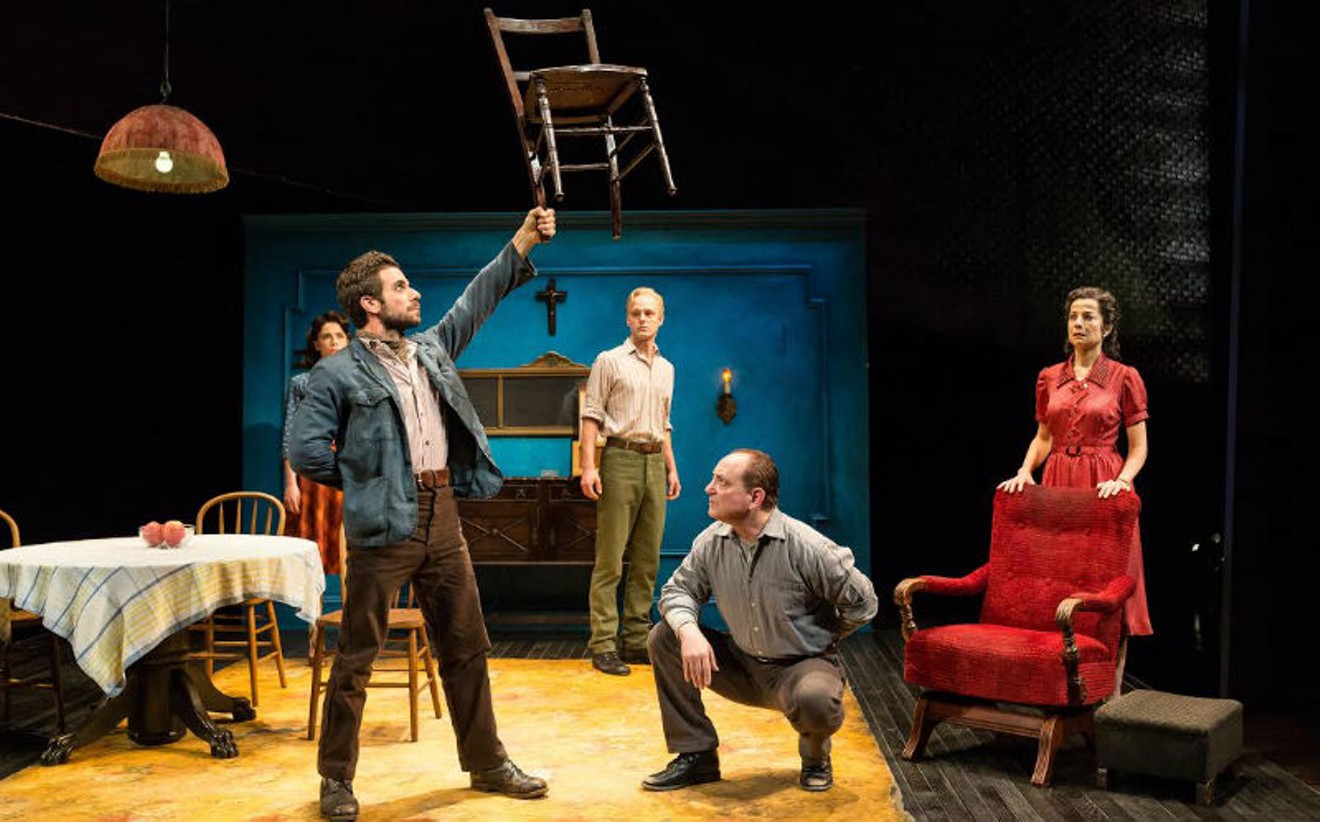A View From the Bridge
There's a searing moment near the denouement of Arthur Miller's A View From the Bridge (1955), scorching nicely at the Alley Theatre, that elicits gasps from the audience. Two moments, actually, and they occur within seconds of each other. Both are kisses.
For those unfamiliar with Miller's tragic tale of honor, pride, betrayal, and sexual obsession on the Brooklyn waterfront, the kisses are shocking in their painful naked revelations of main character Eddie Carbone (a raspy and rumpled Mark Zeisler). He's been aching to do this the entire play, and they seal his doom.
Still smarting from the insidious after effects of the Commie-hunting House Un-American Activities Committee (HUAC) with its blacklists and informers, Miller had another say on the matter in View, although he had covered the subject, sub-rosa, in his previous The Crucible (1953), a smash hit on Broadway about the Salem witch trials. Now, he takes on the informers in boldface as he shape-shifts the morality onto the “little guy,” Eddie Carbone, a dockworker in Red Hook, Brooklyn, who will betray his family and neighborhood because he lusts after his nubile niece Catherine (willowy Cara Ronzetti). Miller's protagonists are flawed men, usually rigidly moral and upright, veering toward the righteous and unyielding. They're starchy, but sex does them in. So is it with Eddie.
Ever since Catherine came to stay with Aunt Beatrice (an affecting Josie de Guzman) and Uncle Eddie, she's been watched over protectively by the gruff working-class guy. Now that she's grown into a fetching young woman, Eddie's paternal concerns turn dark and creepy. Wife Bea notices this before anyone, asking him bluntly why she's no longer a wife to him. When two illegal Sicilian immigrants, brothers Marco and Rodolpho (fiery Frank de Julio and sympathetic Jay Sullivan) are smuggled into the country and given dock jobs by “the syndicate” and rooms in Eddie's house, Eddie's obsession with Catherine spirals out of control. Jealous of her attentions to the soft Rodolpho, who's shockingly blond, sings, dances, sews a dress for her, cooks, and courts her, Eddie's insinuations about the “punk” (a '40s euphemism for gay) lead him inevitably toward his darkest impulses. He rats them out to the immigration authority. In the highly structured Italian community, this is blasphemous, the worst offense possible. But Eddie can't help it. Like the ancients, he is driven by the Furies.
All this has the tinge of Greek plays, and there's an omniscient narrator, lawyer Alfieri (the ever capable Jeffrey Bean) who lays out the scenes and comments knowingly to us in the manner of some Greek Chorus. But not even Bean can make Eddie a fall guy. Eddie has his own streak of self-destruction built in. He makes horrible choices, and we don't like him very much. Blustery and self-absorbed, he bulldozes his wife, Catherine, his friends, and innocent Rodolpho. Marco has his own built-in code of honor, and when Eddie turns on him, the inevitable happens.
The impression View makes isn't so much ancient Athens as verismo opera. It's no surprise that the play has twice been turned into an opera. Miller's taut dramaturgy, even expanded into full-length from the original one-acter, is fraught with an urge to sing. With its seething passion, strong communal bonds, and forefront sex, it's like the best of Mascagni, Leoncavallo, and early Puccini.
The gliding sets by Hugh Landwehr arise from the stage floor (Alfieri's desk does its own star turn) or appear from behind and float into view. This is crisp modern stagecraft that lends another layer of modernity to what Miller perceived as classical. Director Gregory Boyd keeps everything on slow boil, ratcheting up the tension with pace and style, allowing Miller's linguistic flourishes and comic lines (yes, Miller can be surprisingly funny) to reverberate with startling power.
And it's nice to see some new faces at the Alley. Zeisler is a veteran player of Eddie, on Broadway (the 1998 revival) and at Seattle Rep, and is most comfortable inside his weaselly skin. He seems to get more tarnished as he morally disintegrates, and let's us see how thin his gruff shell really is. Ronzetti, as innocent Catherine who refuses to believe the stories Eddie concocts about Rodolpho, has those Brooklyn “demz” and “doze” down pat and is quite a vision in Alejo Vietti's sundresses. But it's de Julio, as dark Marco, who blazes on stage. Just the way he sits in a chair, and we know the banked fires within, waiting to combust. Subtle and commanding, his performance is etched with empathy, quiet strength, and abiding loyalty. When he rasps against Eddie, he creates sparks.
This is kitchen-sink drama with a vengeance, and continues to pack a punch. Listen to the audience's reactions throughout as we're drawn tighter into the tragedy's gnawing inevitability. Miller's primal scream is potent.

Kevin Dean (Ed Carmichael), Christy Watkins (Essie Carmichael), Andrew Carson (Donald), Susan Koozin (Penelope Sycamore) and Elizabeth Black (Mrs. Wellington) in You Can't Take It With You.
Photo by Jeff McMorrough
You Can't Take It With You
And now for something completely different. The classic laugh-out loud farce, You Can't Take It With You, the great American comedy by George S. Kaufman and Moss Hart (1936), romping merrily at A.D. Players in that company's brand new eye-popping space, the George Theater.
And what room they give this romp in Liz Freese's be-cluttered yet spacious set. Everything's in place: the snake tank; grandpa's dart board; the swinging kitchen door that's in constant swing; the candy dish shaped like a skull; Penny's old typewriter; Ed's printing press and xylophone; the basement door from which emanate Mr. De Pinna and Mr. Sycamore's booms and crackles of fireworks and the occasional large puff of smoke; the comfy divan upon which drunk actress Gay Wellington collapses; the dinner table where the zany family and friends bond every day; a staircase platform where daughter Essie can practice her pirouettes under the tutelage of Russian ballet master Kolenkhov (“She stinks,” is his verdict of her talents); or where sensible daughter Alice can woo her suitor, Ton, son of the wealthy businessman Mr. Kirby and his snooty misunderstood wife, who show up for dinner on the wrong night and enter this house of crazies, run scattershot by harried maid Rheba and live-in boyfriend Donald.
It's all about conformity and what it does to sap your life. Do what you want and be happy, is Grandpa's motto. Since he hasn't paid income tax since it was instituted, he's happy indeed, and contented that he gave up the business rut years ago and spends his time going to commencement ceremonies or the zoo or visiting his policeman friend at midnight. This Pulitzer Prize winner is a paean to family, the American family, with its decency, sweet non-conformity, and idiosyncratic helter-skelter.
The comedy is a marvel of construction, the epitome of what's known as the well-made play. Constructed like a Swiss watch, the play's a wonder of timing. There's nary a pause in the action, for as soon as somebody leaves the room, somebody else scurries on. It's like origami, folds upon folds, crimped into the most amazing fun figure. Director Tom Prior keeps the action non-stop like a traffic cop on a high. The play never slows, as gags are set up then followed through just when needed, or when a punch line is deadpanned, or a wrestling move goes comically awry.
The large cast gobbles up their characters with winking glee. Each is a standout, but you know who comes off with the most truthful portrayal? Lindsay Ehrhardt, as the most conventional character, daughter Alice, who loves her family like crazy. But after the disastrous dinner party, Penny's naughty party game, and the arrest of the entire clan by T-Men which send them all to jail overnight, and us into intermission, she can't imagine the two families every getting together. Ehrhardt has such spirit and naturalness, that we actually fear her forthcoming marriage may be doomed after all. It's a most beguiling performance. But that's not to say the others are chopped liver, far from it. They're caviar.
I list them in order of appearance, and give them their rightful praise: Susan Koozin (Penny, who writes plays because a typewriter was once delivered to the house by mistake), Christy Watkins (dance-mad Essie), Monique Holmes (maid Rheba), Eric Domuret (fireworks-obsessed Paul), Craig Griffin (soot-stained Mr. De Pinna), Kevin Michael Dean (xylophone-mad Ed), Andrew Carson (Rheba's Donald), James Belcher (crusty and wise Grandpa Vanderhof), Chip Simmons (befuddled tax man Henderson), Marty Blair (a besotted Tony), Philip Lehl (as showstopping Kolenkhov), Elizabeth Marshall Black (Miss Wellington on constant bender), Ric Hodgin (stuffed-shirt Mr. Kirby), Patty Tuel Bailey (equally stuffed Mrs. Kirby), and Sally Burtenshaw (Olga, Grand Duchess of Russia now working as a waitress at Child's in Times Square).
Kaufman and Hart's Depression-era fun-house mirror sparkles with zest in A.D. Players' witty rendition. It digs gently against the government, Stalinists, welfare checks, snobs, and anyone who doesn't want to have fun and lets life go by without a smile. There are smiles a mile wide at the Vanderhof house, and plenty of extra room if you happen to drop by. Come visit, you won't want to leave.
A View From the Bridge continues at 7:30 p.m. Tuesdays, Wednesdays, Thursdays and Sundays; 8 p.m. Fridays and Saturdays and 2:30 p.m. Saturdays and Sundays through May 21 at Alley Theatre, 615 Texas. For information, call 713-220-5700 or visit alleytheatre.org. $26 to $99.
You Can't Take It With You continues at 7:30 p.m. Thursdays, Fridays and May 6 and May 20; 2 and 7:30 p.m. May 13 and 27; 2 p.m. Sundays. May 5 through May 28 at A.D. Players, 5420 Westheimer. For information, call 713-526-2721 or visit adplayers.org. $19 to $68.







